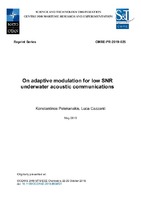| dc.contributor.author | Pelekanakis, Konstantinos | |
| dc.contributor.author | Cazzanti, Luca | |
| dc.date.accessioned | 2019-06-18T10:07:19Z | |
| dc.date.available | 2019-06-18T10:07:19Z | |
| dc.date.issued | 2019/05 | |
| dc.identifier.govdoc | CMRE-PR-2019-025 | en_US |
| dc.identifier.uri | http://hdl.handle.net/20.500.12489/766 | |
| dc.description.abstract | This paper deals with adaptive underwater acoustic (UWA) communications where the receiver must operate at low signal-to-noise ratios (SNRs). The proposed modem is equipped with a set of direct sequence spread spectrum (DSSS) signals of various coding rates and modulation orders. A channelestimate based decision feedback equalizer (CEB-DFE) is used at the receiver. We address the challenge of achieving high spectral efficiencies subject to a combination of bit-error rate (BER) and SNR constraints. To this end, adaptive selection of signals is achieved based on their BER prediction via boosted trees. This ensemble of trees learns directly from the received data and relates the BER with signal characteristics and channel metrics. The efficiency of the boosted trees is validated by post-processing thousands of acoustic signals recorded in the Gulf of La Spezia, Italy. 10-20 times faster communications as compared to a modem with a fixed rate transmission is achieved. | en_US |
| dc.format | 6 p. : ill. ; digital, PDF file | en_US |
| dc.language.iso | en | en_US |
| dc.publisher | CMRE | en_US |
| dc.source | In: OCEANS 2018 MTS/IEEE Charleston, 22-25 October 2018, doi: 10.1109/OCEANS.2018.8604521 | en_US |
| dc.subject | Underwater communications | en_US |
| dc.subject | Acoustic communications | en_US |
| dc.subject | Signal to noise ratio (SNR) | en_US |
| dc.subject | Machine learning | en_US |
| dc.subject | Regression analysis | en_US |
| dc.subject | Probability of interception | en_US |
| dc.title | On adaptive modulation for low SNR underwater acoustic communications | en_US |
| dc.type | Reprint (PR) | en_US |
| dc.type | Papers and Articles | en_US |
